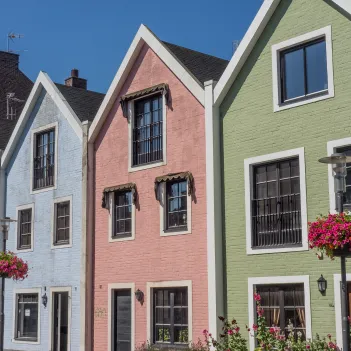MARLENE
Mobility, Accessibility, and Rhythms of Everyday Life in Towns and Neighbourhoods

© Stephan Sühling
- Category
- Project
- Call
- DUT Call 2023
- Duration
- –
- Project coordinator
- The Swedish National Road and Transport Research Institute (VTI)
MARLENE addresses the challenge of applying an integrated spatial and temporal approach to urban design in small and medium sized towns to enhance sustainable accessibility. Concepts like the 15-minute city (15mC) and X-minute city (XmC) have gained momentum as frameworks promoting proximity and access to daily opportunities, mostly focusing on dense urban cores. Small and medium-sized towns face unique challenges, often characterised by monofunctionality and car-dependent mobility, which hinder access and fragment daily routines.
Older adults (65+) in these contexts, although representing a heterogeneous group with differing needs and resources, may be more exposed to accessibility risks due to varying mobility and digital skills. Their experiences can reveal access constraints and opportunities applicable to other potentially vulnerable populations. MARLENE explores whether and how the XmC model can be adapted to smaller towns to address these challenges.
MARLENE addresses the described challenges adopting a co-creation approach across selected small and medium-sized towns in the Czech Republic (Židlochovice), Estonia (Narva), and Sweden (Trelleborg), and focusing on the accessibility and (im)mobilities of the heterogeneous group of older adults. MARLENE pursues 3 main goals:
- deepening the knowledge of everyday mobility and accessibility strategies, needs, resources and constraints experienced within the specific spatiotemporal contexts of small and medium towns – with primary focus on the lived experience of older adults;
- co-developing, together with stakeholders and drawing upon a “co-design for all” approach, possible future accessibility and proximity scenarios, including conceptual and practical challenges and possible solutions;
- co-creating, together with stakeholders, an “Inclusive XmC” toolkit containing planning recommendations for inclusive XmC developments.
The expected results aim to enhance our understanding of the relationship and potential tensions between accessibility, mobility and proximity in small and medium-sized towns, with the goal of supporting the provision of sustainable accessibility to essential urban functions and services for all. The “Inclusive XmC” toolkit, main output of the project, will have the potential to inform the development of integrated spatial, temporal, and mobility planning policies.
MARLENE’s innovative contribution is threefold:
- theoretical – combining spatial and sociological approaches to mobility with concepts and tools that emphasise time and rhythms in the practices of everyday life;
- methodological – developing spatiotemporal approaches to data collection, analysis, and visualisation, especially in relation to mapping and storytelling;
- policy oriented – informing integrated spatial, temporal, and mobility planning policies addressing diverse accessibility needs.
Czech Republic
Estonia
Sweden
Lunds universitet, Masarykova univerzita, Tallinna Ülikool
Independent Living Institute, KORDIS JMK, Město Židlochovice, Narva Linnavalitsuse Arhitektuuri- Ja Linnaplaneerimise Amet, PRO Trelleborg, Trelleborgs kommun
Project video
Connect to YouTube?
To play this video, a connection to YouTube will be established, and personal data will be transmitted to YouTube.
Links
Contact
Chiara Vitrano